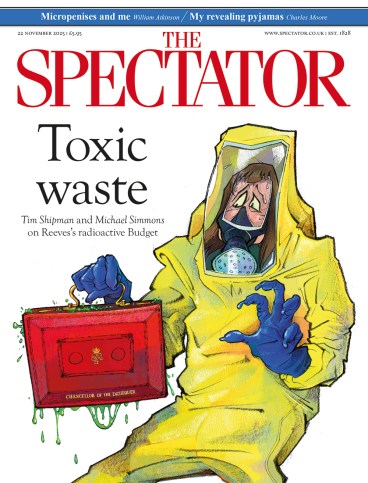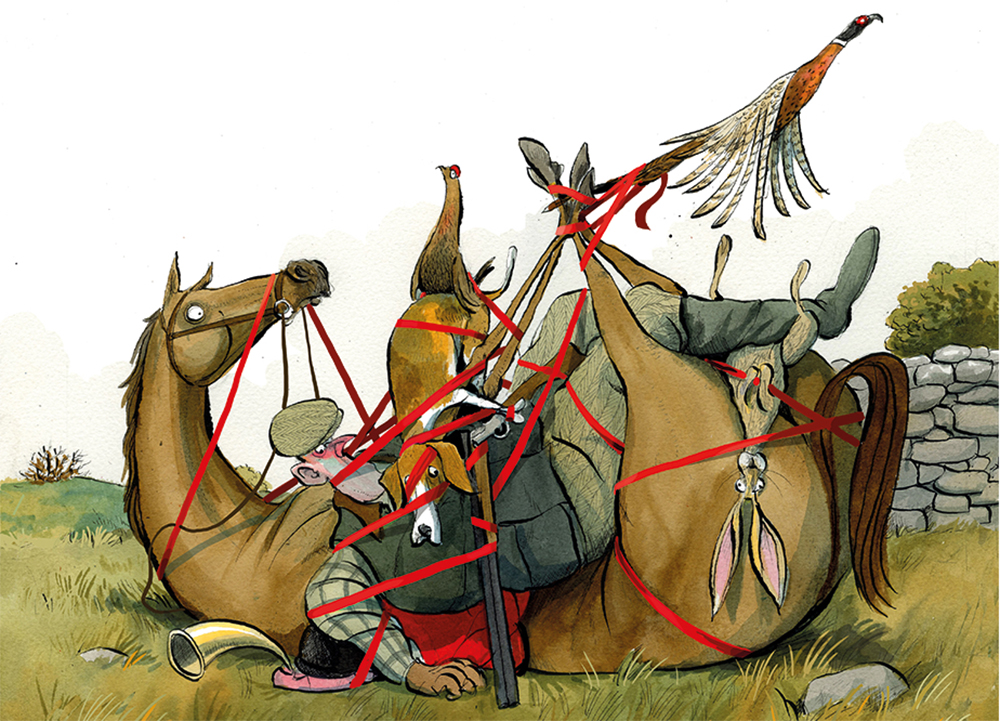
Before the last election, Keir Starmer promised that his party’s relationship with the countryside would be ‘based on respect, on genuine partnership’. But, 16 months into his premiership, the government is shedding rural votes after Rachel Reeves’s changes to inheritance tax. Protesters wearing flat caps and riding tractors have become a familiar sight in Westminster, such is the outrage about the effect on family farms.
At the most recent protests, Labour MPs in rural seats were reduced to begging the Treasury to pause the changes ahead of the Budget. ‘So many of my farmers are pleading with me,’ admitted Samantha Niblett, MP for South Derbyshire. In the words of Ribble Valley’s Maya Ellis, the tax changes endanger Labour’s ‘once in a generation chance’ to demonstrate fairness for rural Britain. According to a poll by the Country Land and Business Association, not a single farmer in the country is planning to vote Labour in the next election. ‘The anger has grown rather than subsided,’ says Tom Bradshaw, the National Farmers’ Union (NFU) president.
Ten million people in Britain live in rural areas. Political opinions range, but even Labour MPs admit that ministers have appeared, at times, to give the impression of being insufficiently responsive to rural needs. Defra – the Department for Environment, Food and Rural Affairs – was one of the losers in last year’s spending round. Ed Miliband’s net zero efforts have enraged various communities by plastering parts of Britain with solar panels. Whitehall’s refusal to publish a major report on farming by Minette Batters, the ex-NFU president and crossbench peer, before the Budget has also fuelled mistrust.
Then there’s Labour’s crackdown on field sports. Consultations are expected to launch shortly to ban trail hunting (hounds chasing a laid scent rather than a fox) and overhaul firearms licensing. The Countryside Alliance fears the latter risks endangering Britain’s £3 billion shooting industry. Legislation that requires every shotgun owner to go through the same licensing process as rifle owners will make it harder for the country’s 500,000 shotgun owners to access shooting. Meanwhile, the spectre of the hunting ban evokes fear in a certain vintage of Labour politician. Tony Blair’s government dedicated 700 hours to the original ban; in his memoir he groaned that it was ‘one of the domestic legislative measures I most regret’.
The Conservatives are determined to exploit the backlash. Kemi Badenoch regularly dons her Barbour jacket for farmers’ protests; Victoria Atkins, her environment spokesman, prefers a Geri Halliwell-style Union Jack outfit. Inheritance tax grabs headlines, but in the long-term the party wants to cut red tape. ‘We want to remind people that we’re the party of the countryside,’ says an aide. ‘We “get” the issues – because a lot of us live it – and we’re trying to win back trust.’
Not a single farmer in the country is planning to vote Labour in the next election, according to one poll
Yet, in the farming community, the unfavourable post-Brexit trade deals and funding settlement mean that suspicions of the Tories remain high. ‘We have a lot of work to do to mend bridges,’ admits one MP. Reform UK is well-placed to benefit. The rural county councils of Kent, Lincolnshire and Derbyshire all turned teal in May. Farmers Weekly magazine runs an annual survey of farmers’ voting intentions. Provisional results show Reform’s support has rocketed from 15 to 40 per cent in 2025, with the Tories halved from 57 to 28 per cent, according to a survey size of 800. Ever keen to demonstrate his rural credentials, Nigel Farage intends to spend Boxing Day at a hunt meet.
The Liberal Democrats sense an opportunity too. Wily old birds like Tim Farron and Alistair Carmichael are guiding a new crop of rural reinforcements, keen to colonise further chunks of the traditional Tory shires. They preach communal values and champion protectionist, pro-European interests. In Wales, Plaid Cymru is also campaigning hard on inheritance tax at events such as the upcoming Royal Welsh Winter Fair. The party last week joined disgruntled Labour backbenchers to attack the Treasury’s ‘complacency’ on its failure to consult Welsh farmers in a withering select committee report.

Labour insists it will not yet give up the fight for the countryside. The lessons of last year have been absorbed by the new intake, who acknowledge the need to unionise, organise and fight their corner. In the last parliament, ‘There were just two rural [Labour] MPs – they could’ve just gone for a coffee’, says one new MP. Now there are more than 100. This means that the government does not reflect the current geographical distribution of Labour MPs. No minister for a truly rural area sits in cabinet: most represent London, Leeds or Manchester seats.
To counter this, two groups have been formed: the Labour Rural Research Group (LRRG) and the Rural Parliamentary Labour Party (RPLP). The former numbers 26 MPs and is chaired by Jenny Riddell-Carpenter, the MP for Suffolk Coastal. It aims to ‘rural-proof’ Labour’s agenda, churning out polling and policies. Meetings have been held with Reeves’s lieutenants James Murray and Dan Tomlinson to avoid more bombs in this year’s Budget. The RPLP is run by Joe Morris, MP for Hexham, and, in the boastful words of one member, it has more MPs in its ranks ‘than the Tories have overall’. ‘We have licence to be just as influential as the more longstanding groups in Labour.’
For these MPs, any hopes of re-election lie in a split vote and the economy turning around by 2029. Like all the wings of the Labour coalition, they are learning how to cope in a world in which there is no money left to spend. Some new MPs are praised by NFU regional representatives for a willingness to engage; others plan to exploit any concessions from Reform in a potential future US trade deal. Most just hope that, in the months ahead, their ministerial colleagues do not entrench the idea that Labour doesn’t care about the countryside.
Much like the 10,000 fishermen during the Brexit wars, the 450,000 agricultural workers in the UK loom large in the popular imagination – even among those with no direct link to the industry. ‘Never pick a fight with a profession that appears in a children’s book,’ warned the Economist 20 years ago during Labour’s last battle with rural Britain. Many in Starmer’s party hope it is advice he heeds.










Comments